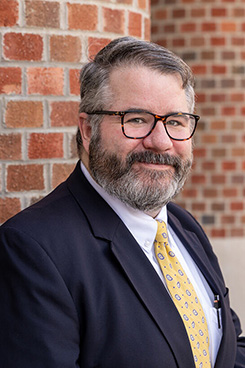
Submitted By Tracey Hackett
Sept 16, 2025
COOKEVILLE, TN - A Tennessee Tech University associate professor of chemistry was named the 2024 Distinguished College/University Teacher of the Year by the Tennessee Academy of Science.
 |
|
| Tennessee Tech Associate Professor of Chemistry William Carroll; image by Nick Fantasia |
The award recognizes William R. Carroll, Ph.D., for his innovative approach to teaching and dedication to undergraduate research. Carroll, who has taught at Tech for 12 years, said the honor reflects both his commitment to students and the support of colleagues who nominated him.
“Across campus, professors are all trying to give the best they can to their students, but as a scientist, I know there are always opportunities to change, improve, and continue to do better each semester,” he said. “It’s flattering and overwhelming to know that my peers recognize and appreciate the effort I make to do that, nominating me and writing letters of support for me for this award.”
The TAS Distinguished University Teacher of the Year award is given annually to a Tennessee faculty member who demonstrates significant contributions to science education, research, and intellectual growth in the state. Nominees must be residents of Tennessee and TAS members.
Teaching primarily upper-division organic chemistry and a course on spectroscopic identification of organic molecules, Carroll has sought to make laboratory work more authentic and engaging for students.
A proponent of course-based undergraduate research experiences, which help undergraduates contribute to student-authored, peer-reviewed publications, Carroll partnered with fellow chemistry professor Ed Lisic before his retirement to provide shared experiences that benefited both courses.
Lisic’s students were creating pharmaceutically relevant organic molecules and inorganic complexes, while Carroll’s spectroscopy students worked alongside them, operating Tech’s analytical instrumentation to establish the identity and purity of the molecules, providing essential data to characterize and report this shared effort.
“Several undergraduate students have been able to author scholarly articles in peer-reviewed journals about the lab work they’ve done,” Carroll explained.
The collaboration produced 12 student authors on peer-reviewed publications, seven student presentations describing the results of the cross-course collaboration, two faculty presentations at national conferences, and inspired a symposium connecting course-based and traditional research experiences.
Rather than sending samples to a technician, Carroll trains his students to operate the spectroscopy instruments themselves. That hands-on skill, he said, gives them a tremendous advantage as they pursue advanced study or enter the workforce.
His teaching philosophy also extends to group projects in organic chemistry, where students select and study pharmaceutical molecules. While students work collaboratively in small groups, grades are assigned individually to ensure fairness. The approach encourages teamwork while maintaining accountability.
The students begin by looking at the structure of the molecule to determine how it affects other chemical characteristics of the substance.
“The structure of a molecule determines the physical characteristics it exhibits. The nature of its bonds determines how stable or reactive it is to outside forces such as heat, pressure, moisture, and other chemicals,” Carroll explained.
Most importantly, the group work helps students find support in a notoriously challenging subject.
“One of the hard things about organic chemistry is that if you’re lost, you often don’t have anyone to help you. This project is set up so that students can naturally build cohorts. It shows them that they’re not alone and, if they work together and encourage each other, they can help each other stay on track,” he said.
Carroll’s teaching efforts have been recognized before. In 2022-23, he received the Award for Innovative Teaching from the College of Arts and Sciences. For him, though, he says the most meaningful recognition comes directly from his students.
“The most validating thing for me is at the student level, seeing them excited about the work they’re doing in organic chemistry and growing more and more as they build their cohorts,” he said.
In his own studies, Carroll said he had experiences that instilled in him both passions for teaching and for research.
“In fact, that’s what drew me to Tech – the mix of teaching and research I get to do here. I really do love and enjoy one as much as the other, and I’m fortunate that, here, I get to do both,” he said.
That enthusiasm has led him to creative courses beyond the lab. During the COVID-19 pandemic, Carroll designed an honors colloquium about the science of bread making, exploring the chemistry behind fermentation, gluten development, and baking techniques.
“That was a fun experience, and it was well received – but it was the pandemic; we all needed an outlet to interact with others, and we all wanted to eat homemade bread,” he joked.
Carroll said the TAS award is a milestone that will continue to inspire his work with both students and colleagues.
“Knowing this recognition comes from support from my colleagues makes me feel like I have a cohort on campus as well,” he said.
The TAS was founded in 1912 and has provided direction for Tennesseans regarding several science issues. The academy organizes symposia, manages programs in numerous fields, and communicates with the national scientific culture. It is affiliated with two national societies and seven Tennessee societies.
